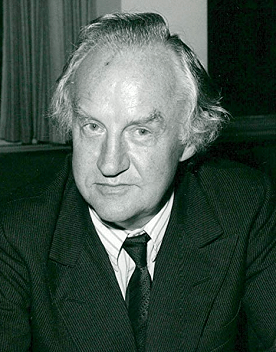Anthony Storr facts for kids
Anthony Storr (born May 18, 1920 – died March 17, 2001) was an English psychiatrist, psychoanalyst, and author. He was known for his writings on human behavior, creativity, and the minds of influential leaders.
Contents
Early Life and Education
Anthony Storr was born in London, England. He attended Winchester College, a famous school, and then went to Christ's College, Cambridge for his university studies. He later trained to become a doctor at Westminster Hospital. Storr was also among the first group of doctors to learn about Jungian analysis at the Society of Analytical Psychology in London. This type of analysis helps people understand their unconscious mind.
His Career
In 1974, Anthony Storr stopped working in private practice. He then took on a teaching role at the Warneford Hospital in Oxford. He continued to teach there until he retired in 1984.
Personal Life
Anthony Storr experienced challenges during his early life. He was married twice. His first marriage was in 1942 to Catherine Cole, who became a children's writer. After this marriage ended, he married writer Catherine Peters in 1970.
Awards and Honors
Anthony Storr received several important recognitions for his work:
- He became an Emeritus Fellow of Green College in 1984. This means he was a respected former member of the college.
- In 1990, he was made a Fellow of the Royal Society of Literature. This honor is given to writers who have made a significant contribution to English literature.
- He received an Honorary FRCPsych in 1993. This is a special award from the Royal College of Psychiatrists.
His Books and Ideas
Anthony Storr wrote many books where he explored different aspects of the human mind.
Exploring Human Emotions
In his books, Storr looked at strong human emotions like aggression (in Human Aggression, 1968) and destructive feelings (in Human Destructiveness, 1972). However, he also believed that these powerful feelings could be used in positive ways. He thought they could be directed towards things like sports, scientific discoveries, and artistic achievements. He wrote about this idea in The Dynamics of Creation (1972).
Music and the Mind
In his book Music and the Mind, Storr explored different ideas about how music began. He discussed how music affects people and what it means to us.
He wrote that while music is often called a "universal language," this can be misleading. He pointed out that it can be hard to understand music from different times or cultures. This suggests that various types of music are mostly shaped by culture, rather than being based on natural rules.
Understanding Leaders
In his last book, Feet of Clay; Saints, Sinners, and Madmen: The Power and Charisma of Gurus (1996), Storr studied patterns in how certain influential leaders, sometimes called "gurus," develop. He looked at how people become powerful figures and why others follow them. His study aimed to understand the psychology behind such leadership.
See Also
- Richard Webster
- The Assault on Truth
 | John T. Biggers |
 | Thomas Blackshear |
 | Mark Bradford |
 | Beverly Buchanan |


